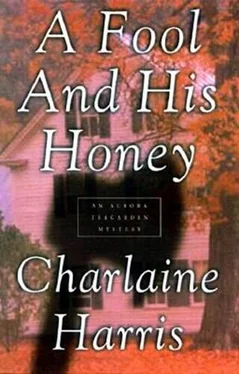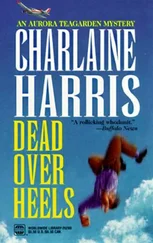“This beautiful thing would rather have a glass of wine, Catledge,” I said, smiling. “Besides, I don’t think you can bend down far enough.” I’m four-eleven.
“Honey, I’d amputate my legs for the chance,” Catledge said dramatically, and I laughed.
“Ellen might not care for that,” I said, handing him my coat.
Martin reached past me to shake hands, and in a moment the men were deep in conversation about some yahoo’s chance in the Georgia governor’s race. I expected a flushed and harried Ellen to rush from the kitchen, but instead I saw her strolling through the garage door holding a brown paper bag containing, from its shape, a bottle of wine. She was groomed to a tee and in no great hurry, either. I had a moment of surprise and then Ellen was bending down to peck my cheek, and I was reconnecting with the bundle of nerves that was Ellen Dawson Lowry.
Ellen was maybe five-ten, as tall as Martin, and thin as a rail. She dressed beautifully, used minimal makeup, would be an unobtrusive blonde for the next twenty years with a little help, and had graduated with honors from Sophie Newcomb. She’d intended to be a CPA. Then she’d married Gatledge, and all her mild ambition had been consumed in Catledge’s flashy brilliance.
Ellen had told me she’d been happy when their sons had been young, and happy when she worked at the bank for a few years while the boys were in high school; but Catledge had wanted her to quit when he’d been elected mayor, and she had. At one time, when we’d had to work together on the board of a charity, we’d felt rather close. But after our year on the board was up, it had seemed harder and harder for us to meet, and our brief closeness faded.
“Roe, you just get prettier and prettier!” Ellen gushed.
“Oh, Ellen,” I mumbled, embarrassed at her strange manner.
Ellen’s eyes had a glaze to them, and her hands moved nervously up and down the skirt of the dark blue-and-gold dress. The colors were becoming, but Ellen had lost even more weight and looked almost painfully thin.
“What do you hear from your boys?” I asked.
“Jefferson’s tenth in the senior class at Georgia Tech, and Tally is… working on a special study in Tennessee.” Despite her hesitation over nineteen-year-old Tally’s current occupation, Ellen was like most mothers in her pleasure in talking about her children, and my questions kept our conversation rolling along until Mrs. Esther came in to announce dinner. Martin and I exchanged discreet glances.
Lucinda Esther is a notable personality in Lawrenceton, and the fact that the Lowrys had hired her to produce this meal surprised us. This was not a dinner on which some important deal depended; this was not a crucial social event. Hiring Mrs. Esther always signaled that the meal was significant, perhaps when the parents of the bride entertained the parents of the groom for the first time, or when an important newcomer was welcomed into an affluent home.
Maybe, in this instance, it meant the hostess was not capable of producing a suitable meal.
Standing with massive dignity in a starched gray uniform with a white apron, Mrs. Esther said, “Dinner is served.” She did not meet our eyes or wait for a reaction, but strode back into the kitchen, her dark face still impassive, her chin proudly up. The heavy gold hoops in her pierced ears swayed as she walked.
Mrs. Esther didn’t serve. She placed the food ready on the table and remained in the kitchen until it was time to clean up. And she almost always prepared a menu she’d decided on herself. Tonight she’d picked chicken baked in a white sauce, green beans, homemade rolls, sweet potato casserole, and a tossed salad. Calories and cholesterol were not considerations in Mrs. Esther’s catering business.
After we’d all passed the dishes around, which was a pretty effective icebreaker, Martin asked me to tell Catledge what had happened in our backyard that afternoon.
As I turned it into an amusing vignette, without the element of anxiety that had given the incident its edge, naturally I glanced from Gatledge to Ellen and back. Catledge was at the end of the table to my left and Ellen was opposite me. Their reactions were more intriguing than the story. Catledge was shaken, visibly upset; Ellen thought the whole episode was vastly amusing. I’d have sworn Catledge would laugh and Ellen would worry. This reversal was very interesting.
To my further fascination, Catledge cut the ensuing discussion off at the knees. I was just sure as sure can be that ordinarily Catledge would spend a good fifteen minutes speculating about who’d “spiked” Darius Quattermain’s acetaminophen. Yet here he was, trying to shunt the conversation into the ongoing battle between two factions of the library board. I shot a significant look at Martin while Ellen was fetching more tea from the kitchen and Catledge had excused himself.
I can’t let puzzling behavior go by without picking it apart to discover its cause. Suddenly I wondered if Ellen had been the unnamed woman who’d been sabotaged by the medicine switcher.
I was pleased with the idea, the more I hammered it out. Twitchy Ellen was very likely to have tranquilizers in her purse. She was certainly abnormally serene tonight. Perhaps Catledge feared staying on the subject of Darius Quattermain because he thought Ellen likely to reveal her own little episode of similarly bizarre behavior? He would hate it to be known Ellen took “nerve pills.”
The silence that had fallen over the dinner table was so awkward that Martin felt compelled to break it.
“We had a surprise visitor today,” he said easily.
“Who was that?” Catledge asked, right on cue, relief easy to read in his voice.
“My niece came to visit, with her baby boy,” Martin said.
I cocked an eyebrow at him. We weren’t going to mention Regina’s visit, we’d decided.
“A boy,” Ellen said. “I miss our boys. They were adorable babies. But all cute babies grow up and leave home, don’t they?” That should have been said in a light tone, but it wasn’t. Ellen’s voice grew more and more edgy with every word. Once again, an uneasy silence fell over the table.
Ellen pushed her chair back and rose, maybe a little unsteadily. “Excuse me, please,” she said, managing to sound almost normal. “I’m being a bad hostess. I feel unwell.” And walking quickly, her backbone stiff, she was out of the room and going up the stairs, face carefully turned away.
“I’m so sorry Ellen is ill,” I said instantly. “She should have canceled. We would have understood. Bless her heart, she worked so hard when she should have been in bed.” I hoped my chatter would fill the silence and smooth things over, and to some extent it did.
“Ellen never knows when to take things easy,” Catledge said gratefully. “We’d love to have you back when she’s well.”
“Oh, no, it’s our turn,” Martin contributed. He was already up and retrieving my coat. “We enjoyed the evening, I’m just sorry it ended this way.”
As Martin and Catledge kept up the social end of the evening, I stepped into the kitchen to tell Mrs. Esther that I’d enjoyed the food and that she could clear the table. Mrs. Esther was sitting at the small breakfast table in the bay window in the kitchen, reading How Stella Got Her Groove Back. Just as I opened my mouth to speak, I saw that the kitchen door to the garage was being pulled shut, and I understood that Ellen had gone down the back stairs, stepped silently through the kitchen, and-this I definitely heard-was starting up the car in the garage.
When I looked from the garage door back to Mrs. Esther, I saw that she was regarding me with an absolutely neutral expression. As clearly as if she’d spoken it, her face said, “This is none of my business and I don’t want to know.”
Читать дальше












